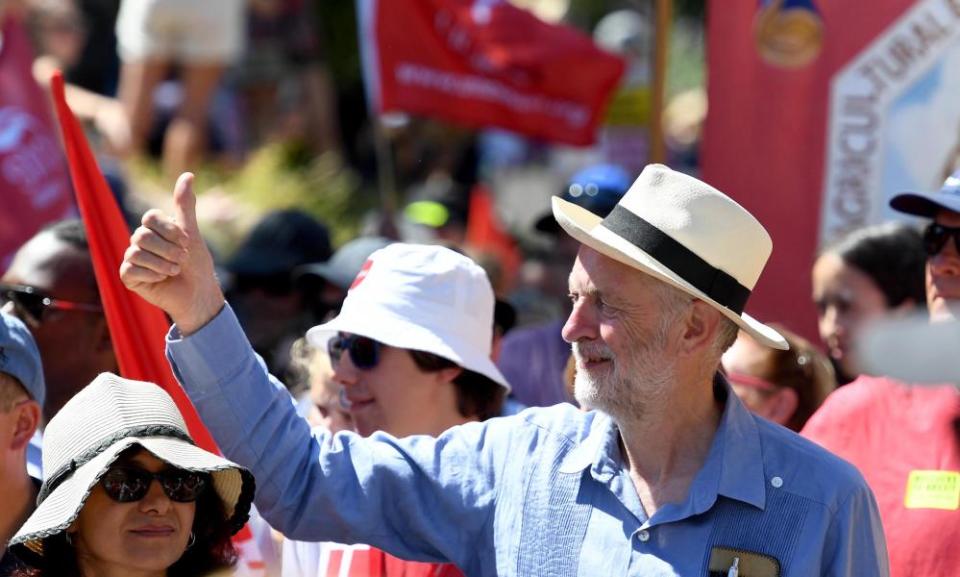Labour should drop action against Margaret Hodge, McDonnell says

Labour should drop its disciplinary inquiry into Dame Margaret Hodge for calling Jeremy Corbyn an antisemite, the shadow chancellor, John McDonnell, has said.
At a meeting of the parliamentary Labour party on Monday some MPs and peers are planning to push an emergency motion saying the PLP should adopt a fuller definition of antisemitism, “including all of its accompanying examples”, in what would be seen as a rebuke to Corbyn.
As Corbyn defended the inquiry into Hodge remarks, McDonnell, his close friend and ally, said that if it could not be abandoned, the Hodge investigation should be resolved very quickly because it was best to “move on”.
In an interview on Sky’s Sophy Ridge on Sunday, he said: “I’ve worked with Margaret over the years, I was the chief exec of an organisation that she was chair of for over 10 years [the Association of London Authorities], she’s got a good heart.
“Sometimes you can express anger – I’m one of these people who has in the past – and basically you have to accept that sometimes people can be quite heated in their expressions. Let’s understand that and just move on.”
Hodge called Corbyn an “antisemitic racist” in an angry row in the House of Commons on Tuesday after Labour’s national executive committee refused to abandon a controversial new code of conduct on antisemitism. The code features the internationally accepted International Holocaust Remembrance Alliance (IHRA) definition of antisemitism, but does not replicate in full a list of examples of antisemitism published by the IHRA alongside its definition.
After Hodge made the comment, a spokesman for Corbyn said it was unacceptable and that action would be taken. This provoked anger from Corbyn’s critics in the party, not least because Hodge, a former minister and former chair of the public accounts committee, is a respected figure.
McDonnell told Sky: “Someone has made a complaint so that’s being investigated. My view is let’s resolve this very, very quickly, almost drop the complaint, and let’s move on. Or if someone wants their complaint investigated, let’s get that done quickly.”
Corbyn took a less conciliatory view when he was asked about the Hodge incident in an interview at the Tolpuddle Martyrs festival in Dorset.
“I felt not pleased about it,” he said. “I felt upset about it, but as always I am very calm and treat people with a great deal of respect. I don’t shout at people, I just listen to what they have to say.
“A complaint has been registered and that will have to be dealt with by the party, but that is independent of me.”
Labour’s code of conduct includes a section listing only some of the examples of antisemitism published by the IHRA alongside its definition. The four missing examples are: accusing Jewish people of being more loyal to Israel than their home country; claiming that Israel’s existence as a state is a racist endeavour; requiring higher standards of behaviour from Israel than other nations; and comparing contemporary Israeli policies to those of the Nazis.

But Labour says it is wrong to say that these examples have been left out, because all of them are covered by other parts of the code. For example, there is a section that specifically states: “It is wrong to accuse Jewish citizens of being more loyal to Israel, or to the alleged priorities of Jews worldwide, than to the interests of their own nations.”
The Labour leader said he hoped the parliamentary Labour party debate would be delayed until the autumn because, with the summer recess starting on Tuesday, attendance might be limited.
“I’d rather they delayed that discussion until September because there will be a full attendance at meetings in September,” he said.
“I also think MPs should get full notice of that issue, but obviously the parliamentary party is quite free to debate it but, as with all functions of the Labour party, ultimately, standing orders must be approved by the national executive committee and that cannot happen until the autumn.”

 Yahoo News
Yahoo News 
